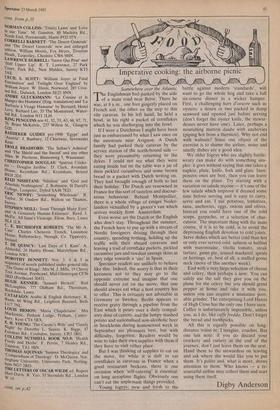Imperative cooking: the airborne picnic
Somewhere over the Atlantic
The Englishman had parked by the side of a main road near Brive. There he was, at 8 a.m. , one foot gingerly placed on French soil, the other on the step to this vile caravan. In his left hand, he held a bowl, in his right a packet of cornflakes which he was discharging into the bowl.
If I were a Dutchman I might have been just as embarrassed by what I saw once on the autoroute near Avignon. A Dutch family had parked their caravan by the service station of the north-bound side they were presumably returning to the dykes. I could not see what they were eating inside but on the table was a jar of their pickled cucumbers and some brown bread in a packet with Dutch writing on. They had brought enough of both to last their holiday. The Dutch are renowned in France for this sort of tasteless and discour- teous behaviour. Behind Montpellier, there is a whole village of émigré Neder- landers victualled by a grocer's van which arrives weekly from Amsterdam.
Even worse are the Dutch or the English who don't stay. Throughout the summer, the French have to put up with a stream of Nordic foreigners driving through their country, spending nothing, holding up the traffic with their absurd caravans and leaving a trail of cornflake packets, pickled cucumber jars and sawdust sausage skins as they edge towards a 'site' in Spain.
Spectator readers are unlikely to behave
like this. Indeed, the worry is that in their keenness not to they may go to the opposite extreme and imagine that one should never eat on the move, that one should always eat what a host country has to offer. This is certainly not advisable in Germany or Sweden: Berlin appears to receive gravy through a pipeline from the East which it pours over a daily compul- sory dose of carrots, and the lumpy mashed potato and nationalised non-alcoholic beer in Stockholm during homosexual week in September are pleasures best, but with difficulty, forgotten. Readers would be wise to take their own supplies with them if they have to visit either place.
But I was thinking of supplies to eat on the move, for while it is daft to eat cornflakes in caravans in France when a good restaurant beckons, there is one occasion when 'self-catering' is essential: on long aeroplane flights. Obviously one can't eat the unpleasant things provided.
Young fogeys, new and fresh to the
battle against modern 'standards', will want to go the whole hog and take a full six-course dinner in a wicker hamper. First, a challenging hors d'oeuvre such as oysters: a dozen or two packed in damp seaweed and opened just before serving (don't forget the oyster knife, the stewar- desses never have one). Later, perhaps a nourishing mutton daube with anchovies (piping hot from a thermos). Why not end with walnuts? Since one object of the exercise is to shame the airline, noisy and smelly dishes. are a good idea.
We older fogeys who are slightly battle- weary can make do with something sim- pler: it goes without saying that one takes a napkin, plate, knife, fork and glass. Inex- pensive ones are best, then you can leave them on the plane. Try starting with a variation on salade nicoise — it's one of the few salads which improve if dressed some time before serving and is easy to carry, serve and eat. I use potatoes, tomatoes, tuna, anchovies, eggs, onions and olives. Instead you could have one of the cold soups, gazpacho, or a selection of char- cuterie. The important thing with the main course, if it is to be cold, is to avoid the depressing English devotion to cold joints. Serve dishes which are better cold than hot or only ever served cold: salmon or halibut with mayonnaise, vitella tomato, steak tartare, game pie, soused mackerel, sprats or herrings, or, best of all, a stuffed goose neck (more of this another week).
End with a very large selection of cheese and celery, then perhaps a tarte. You can safely use the salt they give you on the plane for the celery but you should grind pepper at home and take it with you, unless you can acquire a miniature port- able grinder. The enterprising Lord Harris of High Cross has the only one I have seen. Coffee is unfortunately impossible, unless you, as I do, like caffe freddo. Don't forget the bread and toothpicks.
All this is equally possible on long- distance trains or, I imagine, coaches. But one last note: if you do discard your crockery and cutlery at the end of the journey, don't just leave them on the seat. Hand them to the stewardess on leaving and ask where she would like you to put them. It's polite and, what is more, draws attention to them. Who knows — a re- sourceful airline may collect them and start using them itself.
Digby Anderson














































 Previous page
Previous page